Chronological Order of Marvel Avengers Films Explained
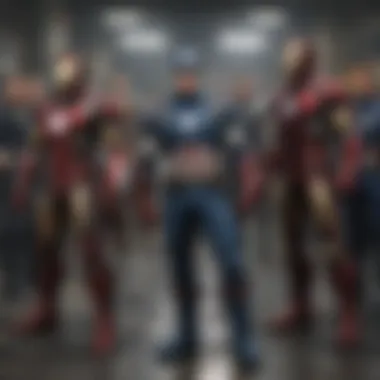
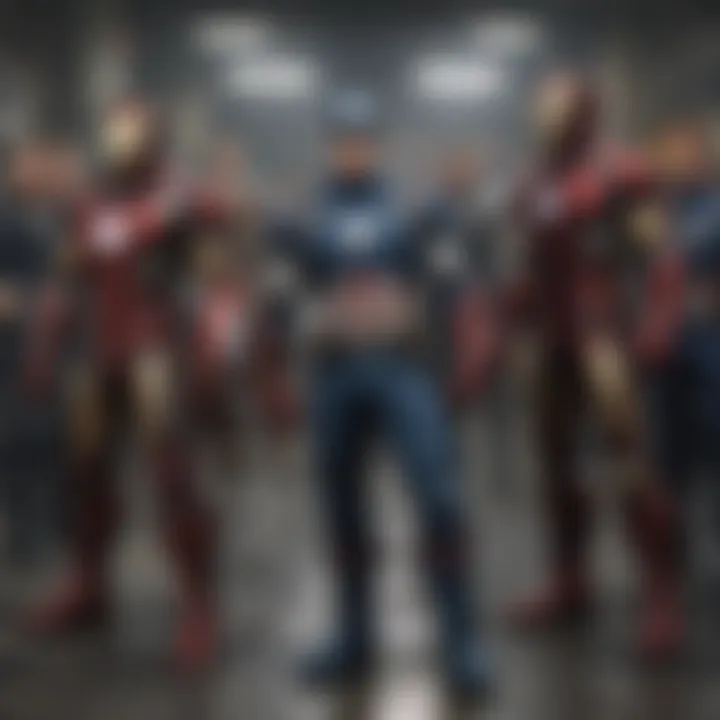
Intro
The Marvel Cinematic Universe, or MCU, is like a sprawling universe unto itself, filled with countless characters and an intricate tapestry of narratives. At the heart of this cinematic journey lies the Avengers films, a series that not only showcases the power of teamwork but also delves deep into the complexities of each character's development. Understanding the chronological order of these films can greatly enhance a viewer's appreciation of the overarching plot and character relationships. It’s not just about watching a superhero save the day; it’s about witnessing how their journeys intertwine, evolve, and shape the universe they inhabit.
As we explore the chronological order of the Marvel Avengers movies, we will dive into their backgrounds, dissect plot points, analyze character arcs, and pinpoint thematic connections. This comprehensive guide is tailored to both those just stepping into the Marvel universe and die-hard fans who wish to revisit the intricate details that make these films resonate.
Overview of the Entertainment, TV Show, or Film discussed
Marvel’s Avengers movies started a new wave in how superhero stories are told on screen. Each film is not just a standalone piece but part of a larger narrative, interconnecting with with other MCU films, creating a rich mosaic that invites viewers to look deeper.
Background Information
The Avengers series began with the release of "The Avengers" in 2012, which brought together various Marvel heroes who had previously been introduced in solo films. Directed by Joss Whedon, this film set the stage for what would become a juggernaut in the film industry. The team includes iconic figures like Iron Man, Captain America, Thor, Black Widow, and Hulk, among others, each facing rivals and their own challenges, while ultimately learning to cooperate for the greater good.
Brief Synopsis of the Plot
In the first film, "The Avengers," Nick Fury assembles these remarkable individuals to face Loki, who threatens to conquer Earth with an alien army. The narrative explores themes of teamwork, sacrifice, and identity, paralleling personal struggles with the broader battle against evil. The subsequent films further develop these storylines and introduce new characters, glitches, and plot twists, keeping fans captivated.
Key Details about the Creators, Directors, Actors
Each film has brought a variety of well-known directors and talented actors into the fold. Joss Whedon directed both "The Avengers" and its sequel, "Avengers: Age of Ultron". Other noteworthy directors include the Russo brothers, who helmed "Captain America: The Winter Soldier" and the concluding pieces of the Infinity Saga, "Avengers: Infinity War" and "Avengers: Endgame."
Moreover, the performances by actors such as Robert Downey Jr., Chris Evans, and Scarlett Johansson have redefined their characters and cemented their places in pop culture. Their dedication to fleshing out their roles is evident, and it adds weight to the films' emotional arcs.
"The essence of any superhero story lies within the characters, their growth, and how they confront adversity together."
Analysis and Critique
Evaluation of Performance and Direction
The evolution of direction in the Avengers films showcases a remarkable transition from a single, cohesive plot to multi-layered narratives. The Russo brothers, for instance, brought a darker tone and complex character dilemmas in films like "Infinity War". This was a stark contrast to the more upbeat vibes seen in earlier entries. Further, the ensemble cast delivers strong performances; whether through humor or heartfelt moments, they consistently bring depth to their characters.
Comparison to Similar Works
Unlike other superhero franchises, Marvel's Avengers films benefit from a well-planned, interconnected storytelling approach. DC Comics films, for instance, often seem to be straddling the fence, with varying quality and a lack of cohesive narrative. The Avengers films shine by weaving a story that feels both expansive yet intimate, fostering a sense of unity among its viewers.
Identification of Themes and Stylistic Choices
Themes of heroism, sacrifice, and resilience resonate throughout the series. Each movie pits the heroes not just against external foes but against their internal struggles as well. Stylistically, the use of humor interspersed with serious moments creates a unique tonal balance. Moments of levity act as a breath of fresh air amidst high-stakes drama.
Episode/Scene Breakdown
Focusing on cinema’s best elements, certain scenes stand out as pinnacles of storytelling.
Notable Scenes and Character Arcs
- "I Am Iron Man": At the end of "Avengers: Endgame", Tony Stark's line echoes across the franchise, encapsulating the character's growth from a self-centered industrialist to a self-sacrificing hero.
- The Battle of New York: This iconic showdown in the first film showcases the synergy of the team as they use their unique abilities to fight against Loki’s forces, marking a crucial turning point in their relationship.
- Scarlet Witch vs. Thanos: A powerful moment in "Infinity War", highlighting Wanda Maximoff’s evolution into a formidable character, fueled by emotion and loss.
These moments carve the emotional backbone of these films, evolving the characters while still pushing the plot forward.
Audience Reception and Ratings
The response to the Avengers films has generally been positive, with audiences praising the character developments and breathtaking action sequences. Box office statistics reveal a stunning trend of growth, with "Avengers: Endgame" grossing over $2.798 billion worldwide, breaking previous records.
Viewer Ratings
- Rotten Tomatoes: Many films in the franchise hold high ratings, with several above 90% in critical reviews.
- Audience Responses: On platforms like Reddit, fans continuously debate and analyze moments, showing the films' significant impact on pop culture.
These insights reveal an ongoing appreciation for the Avengers saga, reflecting a strong bond between the viewer and the content.
Recommendations and End
For those new to the Avengers films, it's advisable to begin with the chronological order, starting with "Iron Man" and working through to "Endgame". Each film builds onto the next, enriching the overall experience.
Ultimately, the Avengers series stands as a monumental achievement in modern cinema. Its legacy continues to evolve, drawing in new fans while satisfying devoted followers of the MCU.
Understanding the Marvel Cinematic Universe
The Marvel Cinematic Universe (MCU) stands as a towering achievement in modern film history, weaving together a tapestry of stories and characters that resonate deeply with audiences around the globe. It serves not just as a backdrop for superhero tales, but as a complex framework that showcases character evolutions, interconnected narratives, and thematic depth. The MCU is not simply a collection of films; it is a well-crafted saga where each entry contributes to a larger story, making it essential for fans to grasp the nuances of this expansive universe.
Understanding the MCU is vital for several reasons. Firstly, it enhances the viewing experience. Fans who are familiar with the MCU's timeline and character arcs can appreciate the subtle callbacks, references, and easter eggs that populate the films. These details are often lost on casual viewers but provide a rich layer of storytelling for those who dive deeper.
Secondly, acknowledging the phases of film releases allows viewers to observe the growth and shifts in tone and style across the franchise. Each phase represents a different chapter, focusing on various characters and their journeys, ultimately leading to grand ensemble events such as "The Avengers".
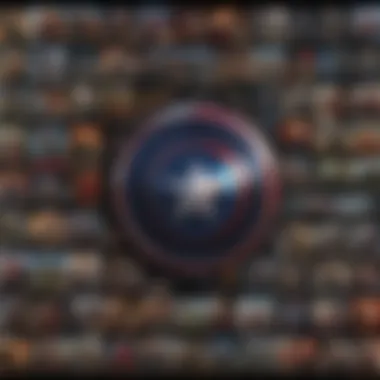

Lastly, an understanding of the MCU's structure aids in grasping its cultural significance. The franchise has not only transformed the blockbuster landscape but also influenced the way stories are told across mediums. The connectedness and character-driven narratives set a new standard in filmmaking, encouraging a trend of shared universes that other studios have sought to emulate.
"The Marvel Cinematic Universe isn’t just about heroes; it’s about the choices they make, the sacrifices they endure, and the bonds they form."
As we dissect each entry in the chronology of Marvel Avengers movies, it’s crucial to recall these elements and consider how they shape our understanding of this immense cinematic journey.
Background of the MCU
The origins of the MCU can be traced back to the release of "Iron Man" in 2008. Initially regarded as a gamble, this film laid the groundwork for what would become a revolutionary series of interconnected films. With Robert Downey Jr.'s charismatic portrayal of Tony Stark, the story not only introduced a beloved character but also established the template for future Marvel films: a balance of humor, action, and heartfelt moments.
As the franchise unfolded, new characters like Steve Rogers and Thor were introduced, each bringing their own unique flair to the table. This diversity enriched the narrative and allowed for a blend of genres, from spy espionage in "Captain America: The Winter Soldier" to cosmic adventures in "Guardians of the Galaxy". The MCU evolved from a seemingly simple narrative of superheroes saving the day into an intricate exploration of morality, identity, and sacrifice.
Key Phases of Release
The journey of the MCU is divided into distinct phases, each marked by significant story arcs and character introductions:
- Phase One: Kicking off with "Iron Man" and culminating in "The Avengers," this phase establishes core heroes and sets the stage for a unified narrative.
- Phase Two: This era deepens character development and introduces new faces. Films like "Guardians of the Galaxy" and "Ant-Man" pave the way for an expanded universe, while continuing arcs from previous films.
- Phase Three: Arguably the most ambitious, this phase brings characters together in monumental battles, such as in "Avengers: Infinity War" and "Avengers: Endgame." It focuses on themes of sacrifice and heroism, culminating the narratives built over the previous phases.
Through these phases, the MCU not only maintained audience interest but continually raised the bar for storytelling, character depth, and cinematic quality. Each movie released during these phases contributed unique elements that, when viewed collectively, form a larger narrative—a characteristic that sets the MCU apart from other franchises.
The Genesis of the Avengers
The formation of the Avengers is a pivotal moment in the Marvel Cinematic Universe (MCU). It signals the culmination of several individual character journeys that pave the way for collective heroism. The Avengers, as a unit, brings together distinct personalities and powers, setting the stage for a grand narrative that stretches across multiple films. This confluence of characters enhances the emotional depth of the storyline, making it more engaging for the audience. The Genesis of the Avengers is not merely about assembling a team; it reflects a commitment to character-driven storytelling that resonates with fans on different levels.
Iron Man as the Foundation
Iron Man is often seen as the keystone that holds the MCU together. Released in 2008, this film introduced Tony Stark, a wealthy playboy and genius inventor. It laid the groundwork for the entire franchise, establishing the essential elements of character development and responsibility. Stark’s transformation from self-centered industrialist to a hero who recognizes the weight of his actions serves as a crucial narrative arc.
In this context, Iron Man does more than just tell a story; it sets a precedent for future films. The introduction of the arc reactor and its significance in Stark's life symbolizes the birth of the modern superhero. By showing his vulnerabilities—his struggles with identity and power—Iron Man invites viewers into a world where heroes are flawed yet redeemable. This nuanced portrayal ensures that the audience remains invested not just in the action sequences but in the characters themselves.
Also noteworthy is the post-credits scene featuring Nick Fury, which teases the formation of the Avengers Initiative. This moment ignites a spark of curiosity and anticipation, generating discussions and theories among fans. It’s this kind of foresight and layered storytelling that makes Iron Man a cornerstone of the MCU.
The Impact of Ensemble Casting
The idea of ensemble casting in the Avengers has profound implications on storytelling within the MCU. Unlike traditional superhero films that often focus on a single character, the Avengers series blends various personalities, each with unique backgrounds, motives, and conflicts. This approach enriches the narrative complexity, as it allows for diverse interactions and character growth.
When each hero brings their personal conflicts to the shared space, it creates opportunities for tension and camaraderie. Consider the dynamic between Stark and Captain America. Stark's cavalier attitude clashes with Rogers' moral rigidity, showcasing how contrasting ideologies can spark charged dialogues and intense situations.
"The characters' interactions drive the plot forward, transforming each movie into a mosaic of heroism intertwined with personal dilemmas."
Moreover, ensemble casting fosters fan engagement in a unique way. Audiences often find themselves rooting for their favorite characters, leading to vibrant discussions and debates on platforms like Reddit or Facebook. The stakes become higher because individual destinies are no longer isolated; they coalesce into a larger narrative. Thus, the impact of ensemble casting in the Avengers serves as a catalyst for not just action-packed sequences but emotional storytelling that keeps audiences on the edges of their seats.
Chronological Sequence of the Movies
Understanding the chronological sequence of Marvel Avengers movies is essential for viewers who want to navigate the sprawling narrative of the Marvel Cinematic Universe (MCU). As the films build off each other, grasping their order not only sheds light on character growth and relationships but also highlights the interconnected storytelling that has defined this franchise. By watching the movies in sequence, fans can better appreciate how plot developments in one film echo or set the stage for events in another. This structure enhances the viewing experience, allowing audiences to see the big picture of the Marvel saga.
Iron Man
Kicking off the MCU in 2008, Iron Man laid the groundwork for the entire series. This film introduces Tony Stark, portrayed by Robert Downey Jr., as a wealthy industrialist who undergoes a profound transformation after his kidnapping. His journey from self-centered playboy to selfless hero is captivating, and it sets the tone for what’s to come. The film’s charismatic blend of humor, action, and groundbreaking visual effects especially stand out, creating a template for future entries. Stark’s evolution is rich in characterization, marking the beginning of a saga where personal struggles intertwine with superhuman challenges.
The Incredible Hulk
Following Iron Man, The Incredible Hulk, released in 2008, attempts to explore the dual life of Bruce Banner, a scientist grappling with the monstrous alter-ego unleashed within him. While Edward Norton’s portrayal adds depth to the character, this film is often overshadowed by its predecessor. Still, it’s critical in establishing Hulk as part of the Avengers’ roster. The themes of rage and isolation echo throughout the MCU, influencing later character arcs and plot devices. The film introduces elements that will be important in future installments, particularly regarding the character's struggles with identity and control.
Iron Man
In 2010, Iron Man 2 continues Tony Stark's narrative amidst evolving conflicts. This sequel expands the universe, introducing new characters like Black Widow, played by Scarlett Johansson, while also reintroducing familiar faces. The film skillfully tackles Stark’s fear of inadequacy and the mortality of a hero, further complexifying his character. Additionally, it opens doors for S.H.I.E.L.D., hinting at an interconnected universe that will be fully realized in upcoming movies. The balance of personal and external conflicts illustrates the fatiguing burden of heroism.
Thor
As we shift gears in 2011 with Thor, audiences are transported from Earth to the mystical world of Asgard. Chris Hemsworth's depiction of the God of Thunder introduces a different kind of heroism—one tied to family legacy and responsibility. The dynamics within the royal family of Asgard, coupled with Thor’s banishment and growth, serve as a compelling narrative. The film enriches the MCU by weaving in fantastical elements and hinting at other realms, broadening the scope of the universe.
Captain America: The First Avenger
Set against the backdrop of World War II, Captain America: The First Avenger tells the origin story of Steve Rogers. This 2011 film contrasts his frail physical state with his unyielding spirit, showcasing themes of courage and sacrifice. Chris Evans portrays Rogers with sincerity, establishing a robust moral compass for the Avengers. The introduction of the Tesseract and its cosmic implications signify key elements that play significant roles in the broader storyline. The rich historical context also adds depth to the Avengers' universe.
The Avengers
In 2012, The Avengers marks a pivotal moment in the MCU, bringing together all previous heroes for an epic showdown against Loki. This crossover film is a high-stakes experience, filled with action, camaraderie, and the struggle of uniting unique personalities. Joss Whedon's direction underscores the balance between character-driven humor and colossal battles. The team dynamic is put to the test, showcasing their strengths and weaknesses in conflict. This film encapsulates the essence of teamwork and sacrifice, setting a benchmark for ensemble casts in superhero films.
Iron Man
After the chaos of The Avengers, Iron Man 3, released in 2013, presents a post-traumatic Tony Stark, showcasing his vulnerabilities. This chapter crafts a narrative deeply rooted in Stark's psyche, as he confronts the fallout from previous battles. The film's clever twists keep the audience on their toes, while the central theme of identity resonates profoundly. The introduction of intriguing side characters enriches the story, ensuring that Stark's journey remains compelling without losing its sense of humor.
Thor: The Dark World
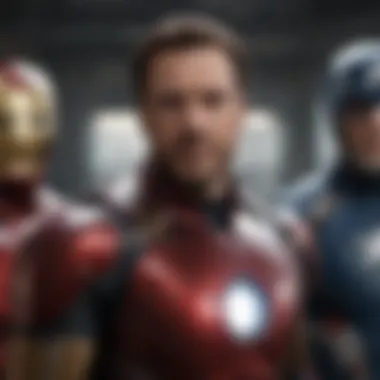
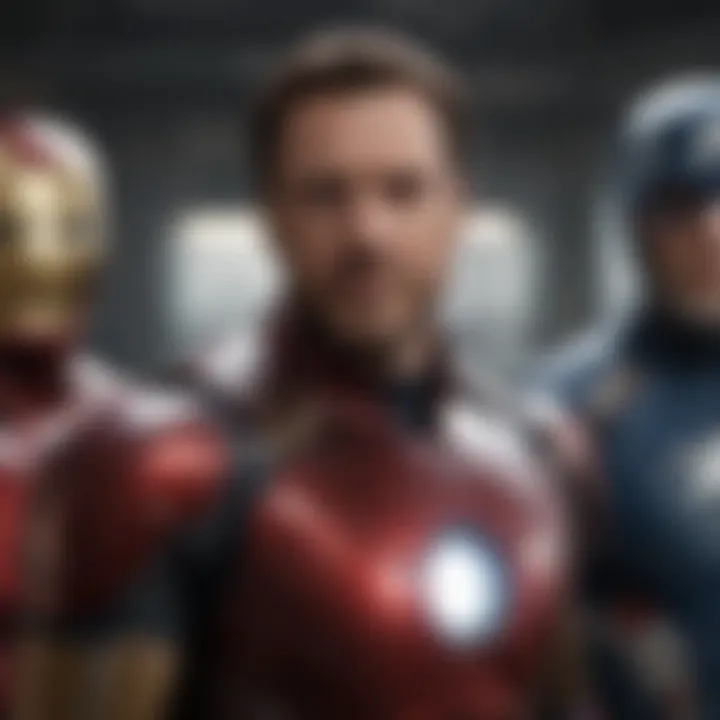
In 2013, Thor: The Dark World dives deeper into Asgard, pitting Thor against a dark force known as the Dark Elves. Although this sequel received mixed reviews, it lays the groundwork for crucial elements in upcoming films. Jane Foster’s arc reveals the complexities of love across realms. The film highlights the threats that loom across worlds, further integrating cosmic tales with Earth-bound heroes.
Captain America: The Winter Soldier
Captain America: The Winter Soldier in 2014 shifts the narrative tone significantly, infusing it with a layer of political intrigue. Steve Rogers grapples with his place in a modern world filled with moral ambiguities. The unveiling of S.H.I.E.L.D.'s corruption plunges Steve into a deep crisis of trust and loyalty, leading to the introduction of complex characters like Bucky Barnes. This film not only refines Captain America's character arc but also sets the stage for larger conflicts brewing within the MCU.
Guardians of the Galaxy
2014's Guardians of the Galaxy introduces a diverse ensemble of characters that deviates from the previous tone of hero films. Humor and heart propel this space adventure, with characters like Star-Lord and Rocket Raccoon marking a new direction in storytelling. This film expands the MCU into the cosmic arena and provides a fresh perspective on heroism, emphasizing family, friendship, and redemption. Notably, it introduces the Infinity Stones, connecting to future overarching narratives.
Avengers: Age of Ultron
Avengers: Age of Ultron, released in 2015, sees the team coming together again to confront a new, artificial menace created in part by Tony Stark’s fears. The film explores themes of artificial intelligence and the consequences of playing god, leading to important character developments, notably for Scarlet Witch and Vision. Despite facing criticism for its pacing, it solidifies the Avengers' role in a world where threats are ever-evolving.
Ant-Man
Ant-Man, released in 2015, offers a more personal story amid the expansive battles of the Avengers. Scott Lang’s journey from thief to hero embodies humor and transformation. This film brilliantly explores the idea of powerlessness leading to empowerment, as Lang learns that one does not need to be the biggest to make an impact. The unique take on heroism, coupled with innovative shrinking technology, showcases the versatility of narratives within the MCU.
Captain America: Civil War
In 2016, Captain America: Civil War unveils a schism among the superheroes, driven by differing ideologies regarding government oversight. This conflict reflects real-world dilemmas and pushes characters like Iron Man and Captain America to their moral limits. The introduction of Spider-Man adds an exciting layer for fans, blending different franchises seamlessly. The film's examination of friendship, loyalty, and consequences elevates it beyond a typical superhero showdown.
Black Widow
The 2021 release of Black Widow dives into Natasha Romanoff’s past, exploring her origins and the sacrifices she's made. This film adds depth to a character that had often been a secondary figure in the ensemble. The exploration of themes like redemption and family creates a poignant narrative, ensuring that audiences understand the complexities of her character before the larger narrative arcs unfold.
Spider-Man: Homecoming
Spider-Man: Homecoming, released in 2017, illustrates Peter Parker's struggles as a high school student while balancing his newfound responsibilities as a superhero. With Tony Stark as a mentor, audiences witness a fresh take on Spider-Man’s story, emphasizing youth and ambition. It builds on the previous films’ narrative, tying into the broader MCU while making Spider-Man relatable and grounded.
Black Panther
Released in 2018, Black Panther transcends entertainment by addressing cultural issues and pride in heritage. T’Challa emerges as a layered hero, facing internal and external battles while highlighting the significance of Wakanda. The film brilliantly integrates socio-political themes, capturing the audience's attention while enriching the MCU’s tapestry with diversity.
Avengers: Infinity War
In a monumental crossover event, Avengers: Infinity War brings together nearly all heroes as they confront Thanos. Released in 2018, the film showcases escalating stakes—both personal and global. The emotional weight of sacrifices resonates, bridging previous character arcs and setting the stage for a climactic showdown with profound implications for the future of the MCU.
Ant-Man and The Wasp
Ant-Man and The Wasp, which follows in 2018, seamlessly blends humor and spectacle while exploring the quantum realm introduced in earlier films. This narrative looks at how personal journeys intersect with larger cosmic conflicts. The film enriches the lore surrounding Ant-Man, adding layers to Scott Lang's character alongside Hope van Dyne, balancing personal stakes with the overarching pressure of the Infinity saga.
Avengers: Endgame
Concluding a decade-long saga, Avengers: Endgame in 2019 delivers emotional highs and storytelling mastery. The film epitomizes the themes of sacrifice, nostalgia, and friendship. By bringing back characters from throughout the MCU, the film examines the real cost of heroism and the lingering impacts of past decisions. The culmination of arcs results in a satisfying, if bittersweet, closure for long-time fans, setting the stage for future narratives.
Spider-Man: Far From Home
Finally, Spider-Man: Far From Home wraps up the Infinity saga in 2019, focusing on Peter Parker's struggle with loss and responsibility. As he navigates the aftermath of the previous films' events, audiences connect with his personal evolution. This film plants seeds for the next phase of the MCU, hinting at new challenges ahead while highlighting the resilience of legacy.
Themes and Character Development
The Marvel Cinematic Universe (MCU) is not just a series of action-packed films featuring iconic superheroes; it is woven together through rich themes and meticulously crafted character development. This article delves into how these elements play a pivotal role in enhancing the overall narrative and emotional depth of the Marvel Avengers movies.
Understanding the themes explored in these films allows viewers to appreciate the complexity of storytelling. It brings forth questions about loyalty, sacrifice, power, and identity. Each character embodies specific ideals and struggles, making their journeys relatable to the audiences.
Exploration of Key Themes
Throughout the MCU, several recurring themes emerge that influence both individual characters and the franchise as a whole.
1. Unity and Teamwork
The Avengers movies frequently highlight the significance of working together. In “The Avengers,” heroes from different backgrounds unite to combat a common enemy. This theme resonates powerfully, as it reflects not just fictional heroes but the real-world idea of collaboration to achieve what one cannot do alone.
2. Sacrifice
Sacrifice plays a prominent role, particularly during critical moments in films like “Avengers: Endgame.” The willingness of characters to give up personal desires for the greater good showcases an essential aspect of heroism. This theme challenges viewers to think about what they would be willing to sacrifice for the people they love.
3. Redemption and Growth
Several characters, notably Iron Man and Loki, experience arcs of redemption, making their journeys compelling and relatable. Characters who begin with flawed motives often evolve into more selfless individuals, providing a message of hope and the potential for personal growth.
4. The Burden of Power
Another poignant theme is the burden that comes with power. Characters like Thor and Captain America grapple with the implications of their immense responsibilities. This exploration pushes viewers to consider how power can corrupt or elevate individuals, emphasizing the complex nature of leadership and authority.
"Watching these characters struggle with their burdens gives each story a greater weight, as it mirrors our daily dilemmas."
The interplay of these themes across various films solidifies their importance to the Avengers saga. Each film is not just a standalone experience but a piece of a larger puzzle where these themes mingle, creating a rich tapestry of storytelling.
Character Arcs Across the Franchise
Character development drives the narrative forward, allowing audiences to connect with the heroes on a personal level. Let’s explore some significant character arcs that stand out in the Avengers storyline.
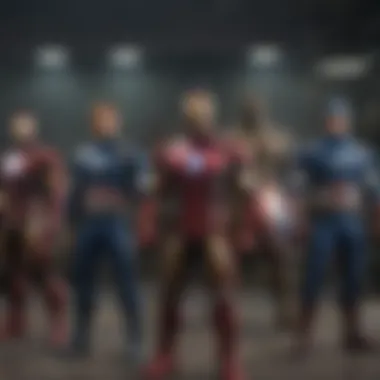
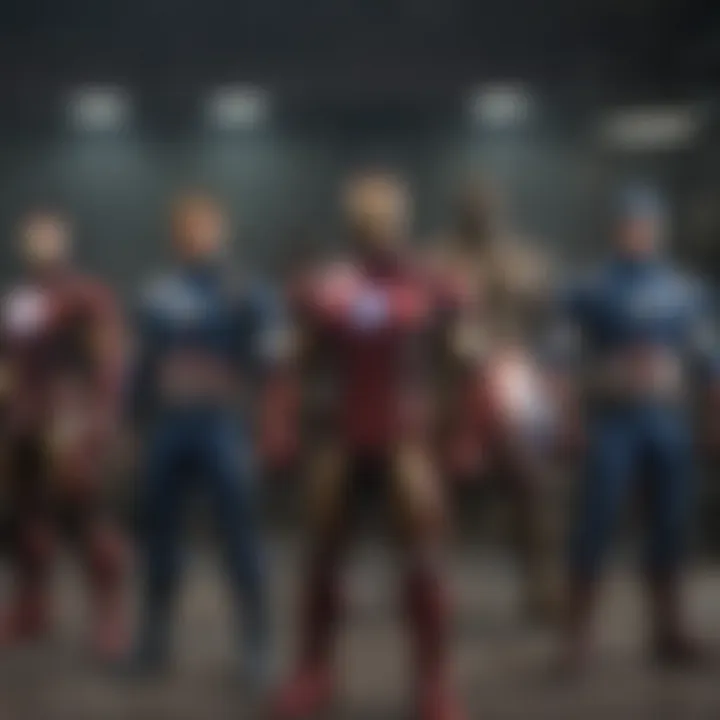
1. Tony Stark/Iron Man
Tony Stark begins as a self-absorbed weapons manufacturer whose life takes a turn after experiencing captivity. His transformation into Iron Man marks the start of his journey from egoism to altruism. Throughout the franchise, we witness his internal struggles, culminating in moments of profound sacrifice. His story is not just about becoming a hero but about becoming a better person.
2. Bruce Banner/The Hulk
Bruce Banner’s struggles with his alter ego, the Hulk, highlight the theme of inner conflict. He represents the character battling personal demons while seeking acceptance. As the series progresses, we see the Hulk evolve, reflecting Banner's journey toward self-acceptance and control over his dual nature.
3. Natasha Romanoff/Black Widow
Black Widow’s arc is particularly compelling due to her historical context. Starting as an assassin, she grapples with her past choices and seeks redemption. Her evolution from a shadowy figure to a hero who fights for justice showcases not only her growth but also the personal toll of her previous life.
4. Steve Rogers/Captain America
Captain America embodies the virtues of courage and honor. His journey explores the clash between idealism and reality. As the world changes around him, he must come to terms with what it means to uphold his values in a society that often compromises them. His unwavering principles present a striking contrast to the changing world.
In summary, the themes and character development within the Avengers films not only make the MCU plot intricate but also remind viewers of the real-life complexities faced by individuals. The relatability of these stories enhances emotional investment, allowing fans to connect deeply with the narrative threads woven throughout the franchise.
Cinematic Techniques and Directorial Styles
Cinematic techniques and directorial styles play pivotal roles in shaping not only the aesthetic quality but also the narrative flow of the Marvel Avengers movies. As this franchise has evolved, tech advancements have paved the way for groundbreaking effects and editing styles, enhancing the overall viewing experience. A director's unique vision can deeply influence how stories are told, infusing each project with personal touches that resonate with audiences.
Directors such as Joss Whedon, the helmsman of the first two Avengers movies, brought a mixture of humor and gravity that engaged viewers differently compared to the Russo Brothers, who directed Avengers: Infinity War and Avengers: Endgame with a darker, more complex narrative lens. The choice of directorial approach impacts how characters shine, how themes are woven through the story, and how emotional climaxes are constructed.
Innovations in Visual Effects
Visual effects have fundamentally transformed the Marvel Avengers saga, propelling the franchise into uncharted realms of imagination. The introduction of sophisticated CGI (Computer Generated Imagery) has allowed filmmakers to create breathtaking action sequences, vibrant alien worlds, and incredible superhero feats that would be difficult to accomplish practically. Take, for example, the spectacle of Thor wielding lightning or the all-out chaos of the battle scenes in Avengers: Endgame.
- Motion Capture: Perhaps one of the most groundbreaking techniques is motion capture, used to render characters like the Hulk. Actors don suits with sensors to capture their movements accurately, which are then translated into the digital realm. This not only enhances realism but also fosters a connection between viewers and larger-than-life characters.
- Real-Time Rendering: In recent films, real-time rendering technologies, introduced through programs like Unreal Engine, have begun to blur the lines between live-action and animation, offering the crew immediate feedback on how scenes will appear. This is evident in scenes where characters interact with vast green-screen backgrounds, allowing directors to make quicker creative decisions.
These innovations have not only made the visuals more stunning but also played integral roles in storytelling, creating immersive worlds that pull viewers into the action, making them feel as if they are a part of the experience.
Differences in Directorial Approaches
When discussing directorial styles within the Avengers universe, it is crucial to appreciate the individual fingerprints left by different creators. Each director brings their own narrative sensibilities and technical methodologies, which significantly shape the final product.
- Joss Whedon: Known for his sharp wit and character-driven storytelling, Whedon's contributions in The Avengers and Avengers: Age of Ultron emphasized ensemble dynamics and humor. His style combined comic relief with high stakes, crafting moments that balanced thrilling action with relatable human emotions.
- Russo Brothers: In stark contrast, the Russo Brothers opt for a darker, more serious tone in their films. With an understanding of complex narratives, their work in Infinity War and Endgame was marked by intricate plotting and character development that left audiences breathless. They handled multiple characters simultaneously while layering emotional resonance, ultimately leading to some of the most memorable twists in the saga.
In summary, the distinct directorial approaches across the Avengers films illustrate how each filmmaker's vision contributes to the wider tapestry of the Marvel Cinematic Universe. Each has involved techniques that resonate with fans, ensuring that the franchise remains dynamic and caters to diverse viewer preferences. As technologies continue to evolve, so too will the cinematic storytelling methods employed by future directors, keeping the Marvel legacy fresh and exciting.
The Cultural Impact of the Franchise
The Marvel Avengers franchise transcends simple entertainment; it has woven itself into the very fabric of contemporary culture. This impact can be seen through various lenses, from the commercial domination of the box office to the fervent fandom that rallies around its characters and stories. As audiences immerse themselves in this intricate universe, the cultural significance of these films reveals its nuances, particularly in how they reflect and influence societal norms, identity, and artistic expressions.
Merchandising and Fandom
The realm of merchandising surrounding the Avengers is a whirlwind of creativity and economic power. From action figures to apparel, the products reflect not just the admiration for characters but also serve as cultural artifacts in their own right. These toys and collectibles allow fans to engage with the franchise beyond mere viewership.
- Toys and Collectibles: Action figures, LEGO sets, and Funko Pop! figures flood the market, allowing fans of all ages to display their affinity for their favorite superheroes. Collectors often go to great lengths to acquire limited-edition items, creating a bustling secondary market.
- Apparel and Accessories: Clothing lines featuring iconic designs have become mainstays in popular fashion. From graphic tees to high-end collaborations, the Avengers’ imagery finds its way into everyday discourse and expression.
Fans do more than just buy products; they create communities centered around shared interests. Conventions like San Diego Comic-Con showcase extravagant displays, cosplay competitions, and panels featuring cast and crew, all feeding into a sense of belonging and shared experience.
"The power of community—a shared love of heroes—fuels a franchise that thrives on connection and creativity."
Online forums such as Reddit and various social media platforms allow fans to post theories, share fan art, and critique storylines. This creates an interactive dialogue, enriching the narrative as fans engage deeply with the material. Their passion fosters a sense of identity, belonging, and personal connection to the stories.
Influence on Popular Culture
The Avengers have not just influenced merchandising; they have also reshaped popular culture in profound ways. Cinema, media, and societal values have been touched by the indelible mark of these films.
- Cinematic Landscape: The success of the Avengers helped pave the way for the rise of the superhero genre in mainstream cinema. Other studios have scrambled to replicate this success, leading to an age where comic book adaptations dominate box offices worldwide.
- Social Discourse: Themes of teamwork, diversity, and ethical dilemmas presented in the films often resonate with current societal issues. Characters such as Black Panther and Captain Marvel bring discussions of race and gender into the forefront, allowing audiences to explore these pivotal themes through the lens of entertainment.
- Catchphrases and Quotes: Lines like "I am Iron Man" or "Avengers, assemble!" have seeped into everyday conversations, showcasing the film's dialogue becoming part of the common vernacular. This phenomenon illustrates how deeply integrated these films have become within popular culture.
Looking Ahead: Future of the Avengers
In the world of the Marvel Cinematic Universe, the future of the Avengers isn’t just a topic of speculation; it’s a realm of endless possibilities. As fans have seen, the MCU continuously evolves, introducing new characters while keeping the legacy of the beloved Avengers alive. This forward-looking aspect is crucial because it reflects the adaptability of the franchise in meeting audience expectations yet again, showcasing how comic adaptations can stay relevant as cultures and interests change.
Potential New Avengers Team
The idea of forming a new Avengers team is both thrilling and perplexing. After the climactic events of Avengers: Endgame, it’s clear that the lineup of the original Avengers can’t carry on indefinitely. As such, a fresh ensemble may include characters like Ms. Marvel, Young Avengers, or even alternative versions of known heroes from the multiverse.
Here’s how a potential new team may shape up:
- Ms. Marvel: Kamala Khan represents a new generation of heroes. Her story offers potential not just for action but for cultural depth within the MCU narrative.
- Shuri: Black Panther’s sister is not just a brilliant mind but a warrior in her own right, making her a suitable candidate to lead a new team.
- Spider-Man: Tom Holland’s portrayal of Peter Parker keeps resonating with the audience. His youth, combined with a legacy, makes him a solid anchor for any new formation.
- Kate Bishop: From Disney's Hawkeye, she's an emerging character that would fit well into the new team dynamic, bringing her own unique perspective.
With all these fresh faces, there are both benefits and challenges. Audiences might find their earlier attachment and nostalgia for classic characters clouding their acceptance of new ones. However, new blood also promises innovative storytelling and character development, which is essential to keeping the franchise alive and kicking.
Upcoming Releases in the MCU
Looking ahead, Marvel has substantial plans for the cinematic universe that go beyond just the Avengers. With several upcoming films and series set to expand the franchise, fans are left wondering where the narrative will head next.
Some anticipated releases include:
- Blade: This film aims to reintroduce one of Marvel's darker heroes, exploring themes of horror within the context of the MCU.
- Fantastic Four: Long awaited, their inclusion could set the stage for wider narratives that intertwine with both Avengers and cosmic elements.
- Secret Wars: If adapted properly, it promises a colossal crossover event that could renew the stakes for the Avengers in ways fans have yet to imagine.
The potential of the MCU feels boundless. The intertwining of old and new will be key, and it’s crucial for audiences to remain engaged. The upcoming movies not only promise to keep the spirit of the Avengers alive but also strategically lay down a roadmap for future adventures.
"As we look ahead, the possibilities for our beloved heroes expand like they’ve just stepped into a fully charged multiverse."
As these developments unfold, keeps fans excited about the endless stories yet to be told, which is, at the heart of it all, what makes being part of the Marvel fandom so thrilling.







